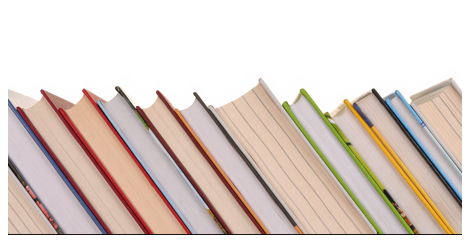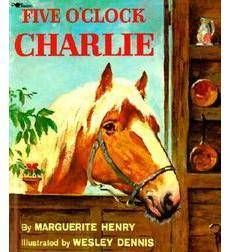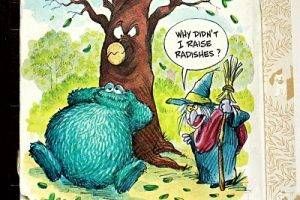
What The Books I Loved As A Kid Taught Me About My Adult Self
Adulthood is a puzzle wrapped in an enigma wrapped in the thin adhesive plastic used to seal CD packaging and then hidden inside a Puzz 3D of, like, Big Ben which you must disassemble and then reassemble perfectly in one sitting while trying to keep a cat off the table you’re working on. If it sounds impossible, you’re not exactly wrong. But as a reader, you probably are already super good at looking for context in order to better understand the subject at hand. When you were just a little lassie or laddie and you stumbled upon a word with just a few too many syllables, what did your teacher probably gently encourage you to do? Look for meaning by connecting it to the words around it. And what word is more mysterious than the word identity? None. None words. But we are lucky ducks, because we have a secret contextual weapon: the books we most adored as kids.
Most parents have at least one book in their home that they have read more than thirty-seven thousand times, and that book is not To Kill A Mockingbird probably. More likely it is less than thirty pages long, with large print, many pictures, possibly animals, and some literary hook that has proved to be simply irresistible to the little lassie or laddie that curls up each night with a fresh and insatiable appetite to hear it all over again. Every. Night. For. The. Rest. Of. Time.
Inevitably, there comes a night when we hear the story for the final time. We outgrow it, or the book is lost in a move or a curious incident involving a hungry dog in the night or some other circumstance. We move on. We read other books, or we give up reading. And we sometimes forget all about our most trusted literary companion—our bottomless font of pleasure and comfort. And the adult reading to us probably has never felt more relieved.
But that old book, that friend, has something to teach us.
Your insatiable appetite was surely for a different book than mine. My nightly demand was for not one but two books. Because I contain multitudes. Obvi. One of the books was Five O’clock Charlie . The other was Cookie Monster and The Cookie Tree. And they are enormous clues to who I was, who I am, and who I am likely to continue to become.
 If you’re not familiar, here are the Cliff’s Notes on these selections. Five O’clock Charlie follows a titular horse who is old as crap and arguably now worthless (I would argue that he is worth a lot, but the opposite case could be made is what I’m saying). He is retired to pasture, where he spends his days chomping clover and contemplating whatever old horses contemplate. His owner has a lot of obvious affection for the dude, seeing as this story is set in the time when glue was less vegan than we would like to believe. So he keeps Charlie around. Charlie is much loved. He is a good horse—sturdy, uncomplicated, a fixture in this family farm.
If you’re not familiar, here are the Cliff’s Notes on these selections. Five O’clock Charlie follows a titular horse who is old as crap and arguably now worthless (I would argue that he is worth a lot, but the opposite case could be made is what I’m saying). He is retired to pasture, where he spends his days chomping clover and contemplating whatever old horses contemplate. His owner has a lot of obvious affection for the dude, seeing as this story is set in the time when glue was less vegan than we would like to believe. So he keeps Charlie around. Charlie is much loved. He is a good horse—sturdy, uncomplicated, a fixture in this family farm.
Every day at five o’clock, old Charlie indulges himself. The plump farmer’s wife bakes fresh tarts, and Charlie is no fool, so like clockwork he comes right on up to the kitchen window where he is hand fed a fresh, steaming, delicious looking treat. He earned it. He dedicated his life in uncomplaining service to others. He had that tart coming.
But life requires balance, you see. My other book of choice follows Cookie Monster, who you probably know. Cookie monster, like Charlie, is uncomplicated but for different reasons—Cookie Monster just wants to stuff his face, okay? HE WANT COOKIE. And that’s good enough for me.
The story involves a witch who owns a tree that grows cookies. What do you expect to happen when Cookie Monster passes by one day and it catches his eye? If you think he merely appreciates its beauty, you have a beautiful faith in the better angels of a monster’s nature. Cookie Monster loses his mind and eats everything the tree has to offer. The final image, which would send me into peels of reeling giggles several pages ahead of time because I knew it as coming, was of Cookie Monster sitting under the tree, bloated to like four times his natural size, looking dazed with a weird combination of joy and remorse spread across his furry face. If there is a moral, I have forgotten it. But I will never forget that picture.
I loved both books tremendously. So what does that mean?
Their Venn Diagram intersects in a small space dedicated to dessert, maybe. And what is dessert if not a tangible, edible, concrete representation of pleasure and joy? That pleasure and joy can be reached one of two ways, perhaps. One can work hard, show restraint, and then relish pleasure as a reward. One can also lose one’s mind and go way overboard in a ridiculous burst of rambunctious chaos because me want cookie.
So that Venn Diagram also contains multitudes. To this day, though I am weeks shy of turning thirty-four, the temple of my character retains those two altars so to speak: the altar of order and the altar of chaos. My driving appetite in life is indeed for joy, and I take genuine pleasure in both the reverence shown by Charlie and the ridiculousness shown by Cookie Monster, both for which there is a time and a place. It takes balance.
For years, this contrast in my nature confused and troubled me. In recent months, I’ve come to accept it more. A lot of credit goes to these two books, my constant friends through so many bedtime rituals.
Perhaps everyone has a thesis and an antithesis swirling around in them, and perhaps we owe it to ourselves to find synthesis. A deep, heartfelt observance of tradition can feel wonderful. There is comfort in routine and work and stability and dependable people. Cutting loose and going over the top can feel wonderful. There is joy in spontaneity, in momentary fun, in celebrating a harmless appetite. If I were to live solely in one mode, I would be denying myself a kind of spiritual dessert that I truly, truly need. And what happens when you have been denying yourself? You eventually overdo it. In the bad way—in a way not motivated by joy but by defiance.
Exhibit A.

Maybe I have hung onto this image for so long because it is also the moral. And maybe I would like to hear these stories one more time before bed.
Okay, maybe two more times.





